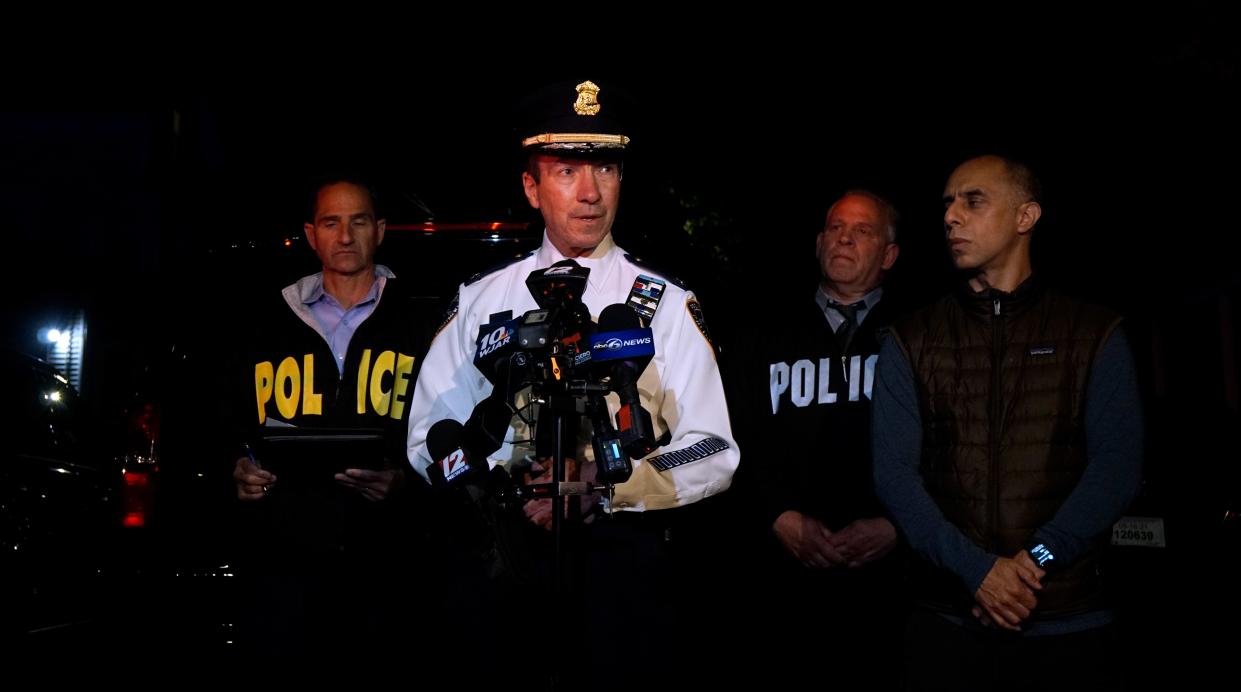Providence chief, long a community policing advocate, to lead that effort nationwide

- Oops!Something went wrong.Please try again later.
- Oops!Something went wrong.Please try again later.
PROVIDENCE — U.S. Attorney General Merrick B. Garland announced Thursday morning that he had appointed the city's longtime police chief, Col. Hugh T. Clements Jr., to direct the federal government's community-policing programs.
Clements will be the next director of an office in the Department of Justice that seeks to strengthen trust between police officers and the public.
The Office of Community Oriented Policing Services (COPS) advances community policing as a practice and crime-fighting strategy by providing resources — including vast amounts of money — that cities and towns can't always muster on their own. COPS has appropriated more than $20 billion in grants since its establishment in 1994.
More from Providence PD:Two men at the top of the Providence Police Department are leaving. What's next for them?
The office "is central to our efforts to strengthen the public trust between communities and law enforcement that is essential to public safety," Garland said in a news release.
“I am confident," said Garland, "that Chief Clements’s leadership will further enable the COPS office to continue its important work to keep our communities safe and build trust and mutual respect between police and communities…"
"I look forward to working alongside him," he added.
Clements describes the appointment as an opportunity to have "profound impact."
The East Greenwich resident grew up in Coventry, where he quarterbacked the high school football team and played shortstop for the baseball team. After that, he lived in the Mount Pleasant and Elmhurst sections of Providence for 25 years.
He graduated from the University of Rhode Island in 1981 with a bachelor's degree in sociology.
After graduating from the city's police academy in 1985, Clements started out as a night patrol officer in Providence.
It was an era when many police officers across the nation were out of touch with the communities they served.
With additional university degrees in justice administration and criminal justice, Clements climbed through the department's ranks. He also held leadership positions in his union, the Fraternal Order of Police.
His down-to-earth leadership style made him popular with other officers.
At one point, a young Rhode Island state trooper, Michael J. Winquist, was asked to embed with Providence police detectives led by Clements. Winquist, now Cranston's police chief, still praises the way Clements welcomed him in front of the group.
Clements' work ranged from uniformed duties to undercover operations to homicide cases. He says he investigated 100 killings.
Toward the top of the hill, he served under Chief Dean M. Esserman.
Esserman, an intellectual with legal training and no experience on a beat, was a major proponent of community-oriented policing. The community-policing philosophy had swept through much of American law enforcement in the late 1990s and early 2000s.
Clements, in his own style, embraced the decentralization of police authority and the ethos of working with residents and community groups, of solving problems rather than simply reacting to crimes.
He recalls a period in the early 2000s when the department sent officers to community meetings in Olneyville and Silver Lake to take notes.
"For the next two months, we addressed those issues," Clements said Thursday, recalling that they would return to the meetings and receive applause.
"They knew we weren't perfect and weren't going to solve everything in the world, but we addressed some problems," Clements said. "Our role became a problem-oriented policing department, fixing the ills in that community."
"It's important to listen to the community," said Clements.
Teny Gross, executive director of the Institute for Nonviolence Chicago, was among the early observers.
Back then, Gross directed the Providence-based Nonviolence Institute, which had a longer name.
Many Providence police officers were somewhat leery of the institute. Clements worked closely with the organization.
In 2023, Gross detects a trend in a polarized nation. In some big U.S. cities, he said, police leaders like the optics of community policing, but they've lost the genuine connection that's necessary and they are moving toward older law enforcement strategies that will fail.
Clements grasps the balance of aggressively targeting groups of lawbreakers while also staying close to the community, Gross said, recalling how he ran into the chief on the street in Providence last summer during a visit. Clements was checking out a festival and staying close to the community, he said.
"For him, it is a way of life," Gross said.
Mayor Brett Smiley has said that he will be soliciting the public's input when it comes to selecting the department's next chief.
This article originally appeared on The Providence Journal: Providence Police Chief Hugh Clements new job is head of federal program

